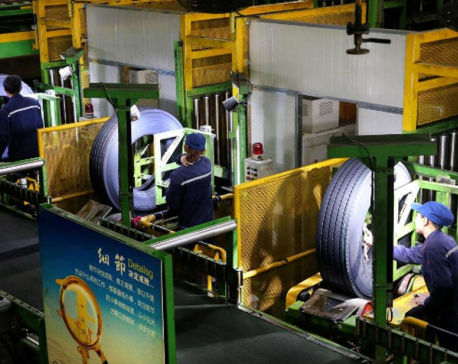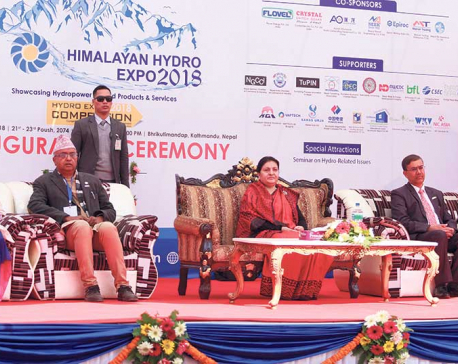
OR
Lack of industrialization hampers GDP growth
Published On: June 8, 2023 07:40 PM NPT By: Dilip Paudel

KATHMANDU, June 8: Due to the lack of industrialization in the country, the contribution of the industrial sector to the Gross Domestic Product (GDP) is low. Although the government has been saying every year that it will create an industrial-friendly environment and increase domestic production, the production has not been able to increase. The average contribution of the industrial sector to the GDP is only 5.6 percent. According to the Ministry of Finance, it is estimated that the production of the industrial sector will be negative by 2 percent in the current fiscal year 2022/23. If the industry does not flourish in the country, there will be a situation where we will have to rely on foreign goods. Due to the lack of industrial production, the gap in the country's trade deficit has also become large.
Industrialists and businessmen are complaining about the lack of a favorable investment environment, high cost of production in the industrial sector, excessive taxes on import of raw materials, difficult and expensive land acquisition process for industries, and taxes levied by the government at three levels.
Vishnu Kumar Agarwal, president of the Confederation of Nepalese Industries (CNI), said that the land acquisition process required to open a new industrial business in Nepal is very complicated.
"It seems that other countries have greatly facilitated land to bring in foreign investment," Agarwal said, "But in our country, the price of land has gone up and there is a lot of problem."
According to Agrawal, the government should now create a conducive environment for industrial development by providing land on lease for a limited time to the private sector industrialists. If the government wants to promote industrial business, it should also ensure stable policies and laws, he argued.
Agrawal said that the government needs to make two types of arrangements for raw materials and readymade goods. He said that foreign investment and resources can be brought in only if the legitimate demands of industrialists are addressed.
Although the government has been saying that it will bring in foreign investment for industrial development, it has not been able to achieve success. The government has downsized the minimum investment threshold to Rs 20 million to facilitate foreign investment.
There is a lack of physical infrastructure required for the industries. Industrialists complain that there is no enthusiasm in establishing large manufacturing industries in Nepal due to lack of investment-friendly environment, political instability, inadequacy of the internal market, lack of competitiveness in the external market, problems in quality certification, and high cost of production.
Chandra Prasad Dhakal, president of the Federation of Nepalese Chamber of Commerce and Industry (FNCCI), said that the government should also protect and promote domestic investment. "In order to promote internal investment, there is a need for a stable policy and legal system," said Dhakal, "The government should create an environment to invest confidently."
Although the country is rich in natural and biological resources, the industries have not flourished. There is a possibility to operate the industries of water resources, forestry and vegetation, mining and minerals and agricultural products. But the government insists that it has tried to create an industrial-friendly environment. The government has given priority to the programs to increase production and employment in the country in the next fiscal year's budget.
It has announced to provide concessional loan and market promotion programs to encourage micro, domestic and small scale industries based on local raw materials. In the budget, Rs 1.20 billion has been allocated for small enterprise development program.
The government has also pledged to provide subsidies to the industries that produce fiber products and handicrafts and to upgrade technology. It is mentioned in the budget that the pace of industrialization will be accelerated with the slogan 'Production and employment: the basis of prosperity'.
The budget mentions increasing production and productivity by maintaining industrial promotion infrastructure and human resource development and maintaining good industrial relations. The government has also pledged to expedite the construction of infrastructure of industrial areas, special economic zones and industrial villages.
You May Like This

Karnali Province’s GDP to grow marginally by Rs 22 billion to Rs 198 billion this year
KATHMANDU, May 6: Bagmati Province, which also has the federal capital of the country, is estimated to contribute over one-third... Read More...

China second quarter GDP growth slows to 27-year low, more stimulus expected
BEIJING, July 15: China’s economic growth slowed to 6.2% in the second quarter, its weakest pace in at least 27... Read More...

Hydropower for industrialization and income generation: President
KATHMANDU, Jan 6: President Bidhya Devi Bhandari has said that generating more hydropower is key to increasing income of people and... Read More...





Just In
- World Malaria Day: Foreign returnees more susceptible to the vector-borne disease
- MoEST seeks EC’s help in identifying teachers linked to political parties
- 70 community and national forests affected by fire in Parbat till Wednesday
- NEPSE loses 3.24 points, while daily turnover inclines to Rs 2.36 billion
- Pak Embassy awards scholarships to 180 Nepali students
- President Paudel approves mobilization of army personnel for by-elections security
- Bhajang and Ilam by-elections: 69 polling stations classified as ‘highly sensitive’
- Karnali CM Kandel secures vote of confidence














Leave A Comment